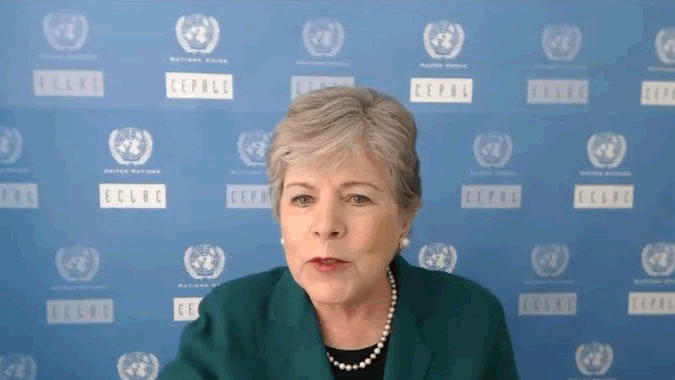ECLAC Urges Economic Recovery Based on Environmental Sustainability and Equality
Work area(s)
The Executive Secretary of the regional commission, Alicia Bárcena, participated in the XXII Forum of Ministers of Environment of Latin America and the Caribbean, organized by the Government of Barbados and the UNEP Regional Office.

The Executive Secretary of the Economic Commission for Latin America and the Caribbean (ECLAC), Alicia Bárcena, urged the countries of the region today to implement a post-pandemic economic recovery based environmental sustainability and equality, through new internal and international political coalitions and unprecedented forms of cooperation to sustain the change in development style.
The United Nations high official made remarks today at the XXII Forum of Ministers of Environment of Latin America and the Caribbean, organized by the Government of Barbados in its capacity as president of the forum, and the Regional Office for Latin America and the Caribbean of the UN Environment Program (UNEP).
Alicia Bárcena participated as special guest on the high-level ministerial panel, “The Environmental Dimension of COVID-19 Sustainable Development Recovery,” led by Mia Mottley, Prime Minister of Barbados, and Inger Andersen, Executive Director of UNEP. Also participating were the Ministers of Environment of Argentina, Juan Cabandié; Brazil, Ricardo Salles; Granada, Simon Stiell; Honduras, Elvis Rodas; and Nicaragua, Sumaya Castillo.
During her remarks, the ECLAC Executive Secretary asserted that the prevailing developmental model is extractive, creates disparity and promotes the culture of privilege and the concentration of wealth.
She added that COVID-19 has magnified the structural problems and pre-existing vulnerabilities of this model in Latin America and the Caribbean, aggravating the cross-cutting inequalities, mediocre growth, low productivity, high level of informal work, insufficient diversification of exports, little fiscal space and growing environmental deterioration.
“The scientific community has consistently warned us about the severity of the environmental issue. We have surpassed critical planetary thresholds, outstripping the load capacity of the natural world that sustains us. Forty-seven percent of our natural ecosystems are deteriorated, 25% of species are in danger of extinction, and perhaps the most concerning of all is the destruction of the ecological integrity of key systems, putting future food supply at risk,” she warned.
Alicia Bárcena affirmed that Latin America and the Caribbean faces a double asymmetry in that it is a region that emits less than 8.3% of greenhouse gases but is highly vulnerable to climate change. She underscored in particular the case of the Caribbean, where more than 50% of the population live five meters below sea level and are very exposed, along with Central America, to growing extreme weather events.
She cited as an example the cases of Hurricanes IOTA and ETA, which caused damages and losses reaching some 2.163 billion dollars in Honduras and 772 million in Guatemala, according to ECLAC’s calculations.
“We join UN Secretary General, António Guterres, in calling for financing to increase from 20% to 50% for the adaptation,” she said.
She underlined that the pandemic is generating multiple economic impacts in the Caribbean, including a 6.9% fall in growth and the expansion of the fiscal deficit. Key sectors, such as tourism, have been heavily affected and, above all, women. The levels of indebtedness are already high, at an average of 70% of GDP, and debt servicing costs reached 30% of income in 2019.
“The region needs financial help on a scale capable of confronting the impact of the crisis. I reaffirm our commitment to ECLAC’s Caribbean First strategy," she expressed.
The ECLAC senior representative emphasized that the environmental issue is crucial for connecting the health emergency to recovery and the decade of action to confront the planet’s primary challenges.
She also highlighted the strategy of Building a New Future: Transformative Recovery with Equality and Sustainability, presented by ECLAC to the countries of the region during the 38th session held in October 2020. During that session, the Commission recommended selecting dynamic sectorial systems through explicit industrial, environmental and fiscal policies that coordinate public and private investments and generate massive formal employment.
“This is what we call 'the big environmental push,'” she underscored.
Finally, Alicia Bárcena urged the implementation of a new agreement and financing compact for the development and refunding of the Bretton Woods Agreement, in order for it, once and for all, to focus on debt in a collective manner, redistribute the liquidity of the north to the south, capitalize on development banks and increase financial support for the adaptation.
Related content
XXII Foro de Ministros de Medio Ambiente de América Latina y el Caribe
Discurso de Alicia Bárcena, Secretaria Ejecutiva de la CEPAL.
Type
Country(ies)
- Latin America and the Caribbean